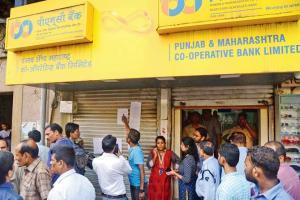With some nationalised banks allegedly turning away housing societies, Minister Subhash Deshmukh allays their fears

The account holders outside a PMC Bank. File pic
Housing societies can open their accounts with any nationalised bank and, if they refuse, citizens could complain to the state, Minister for Cooperation Subhash Sureshchandra Deshmukh told mid-day on Monday. A few housing societies who had their accounts in Punjab and Maharashtra Co-operative Bank have been finding it difficult to open society accounts with nationalised banks. Since PMC is a multi-state scheduled Urban Cooperative Bank, the state cooperation department has no direct control over them and they come under the ambit of the Central Registrar of Co-operative Societies, New Delhi. I have directed the State Registrar to write a detailed note to the Central Registrar for appropriate action," said Deshmukh.
ADVERTISEMENT
Asked about the measures the state will take in the future to prevent financial irregularities in cooperative banks, Deshmukh said, "We have come up with two immediate measures. The Maharashtra Co-operative Societies Act (amended) which has come into force, has provisions where Directors/Members on the boards of Co-operative Banks, if found responsible for irregularities, will not be able to contest co-operative election for two terms (10 years). Also, under Section 97(A), it will be made mandatory for the cooperative department to carry out compulsory special audit of cooperative banks during the five-year tenure of the board."
He added that citizens should play a proactive role than merely depositing and withdrawing money from their accounts. "It is their hard-earned money and many senior citizens survive on the interest from their deposits. People should go through the bank's annual balance sheet and raise queries, become whistleblowers in the largest interest," he said.
Societies concerned
While some housing societies banking with PMC have requested members to deposit maintenance with alternate banks, a Sion society has asked its members to not make any deposit towards maintenance from October until they open a new account in another bank. "We are concerned about the funds we have blocked by way of fixed deposits and saving accounts with PMC and have decided to keep bare minimum balance with cooperative banks," said an office bearer.
An official said since the Cooperative Societies Act mandates housing societies to have their accounts in cooperative banks while formation, many continue to bank with those cooperative banks due to their higher returns. AN Tanawde, who manages around 18 cooperative societies in Central Mumbai said, "Many societies who had accounts in PMC Bank now have no funds to even carry out basic work. A society named Shiv Sneh in Pratiksha Nagar needs major structural repairs and the work has already started, but with no money to pay contractors, residents are now worried."
Advocate Vinod Sampat, who specialises in the Co-operative Societies Act, said, "Banks are at fault for giving loans recklessly to companies floated by wealthy individuals, who in connivance with the management obtain loans even after defaulting payments. The common man eventually suffers. Housing societies should stop the practice of keeping a corpus and huge repair funds in any bank account [such funds should be only put in government securities] and should collect funds directly from members on a need-basis. This will help maintain minimum balance (deposits worth R1 lakh is secured) and in case of any irregularities, the society won't lose their funds."
PMC MD 'optimistic' of HDIL repayment
MANAGING director of the Punjab and Maharashtra Co-operative bank Joy Thomas, in a letter he wrote to the RBI confessing the sanctioning of disproportionate loans to HDIL Group, expressed optimism about the HDIL group repaying all its dues to the bank. "HDIL has as always promised to clear the dues and also gave adequate security to back their loans. We are still very optimistic on the repayment plan of the HDIL group," he said, adding that a roadmap too had been created for the purpose. "We have already closed the fixed deposit amounting to R158.23 crore of the HDIL group and adjusted towards their loan accounts," Thomas wrote in the letter dated September 19.
The letter also speaks of the RBI inspection process, apart from listing the reasons for hiding information from the central bank. "Prior to 2015, officers used to check mostly top few borrower accounts reported by the bank branch-wise. Therefore, these accounts [HDIL] did not come into the picture and it was around 2017 when the RBI noticed them," the letter read, adding, "Some of the large accounts were not reported to RBI from 2008 because of fear of reputational risk. Had we classified them as a non-performing asset, we would have to stop charging interest on these accounts and we could have made losses. The growth path of the bank would have got hampered. The bank had created a name for itself in the market."
Catch up on all the latest Crime, National, International and Hatke news here. Also download the new mid-day Android and iOS apps to get latest updates
 Subscribe today by clicking the link and stay updated with the latest news!" Click here!
Subscribe today by clicking the link and stay updated with the latest news!" Click here!






